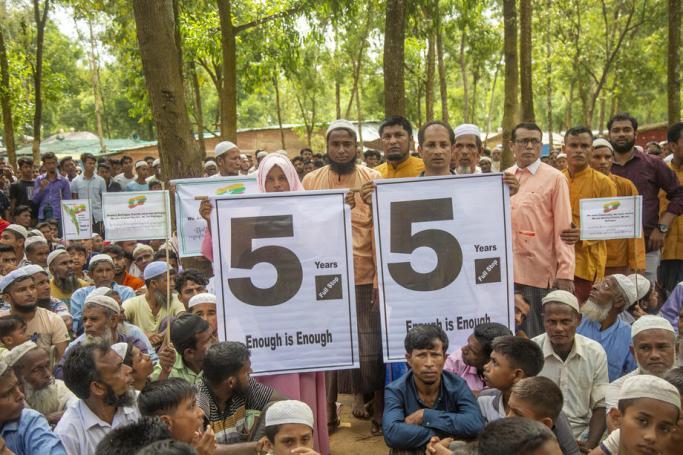Rohingya refugees in Bangladesh should have access to adequate food aid and restrictions on Rohingya rights to work and freedom of movement must be lifted, said campaign organisation Fortify Rights.
The organisation is calling on donor governments to make sure the Rohingya refugees receive enough food and for the Bangladesh government to lift restrictions on Rohingya refugees’ rights to work and freedom of movement.
“Many Rohingya fled genocidal attacks more than five years ago and need reliable support, not cuts to the food on which they depend,” said John Quinley, director at Fortify Rights.
“The cuts on food aid will be dire and could lead to significant health consequences for Rohingya refugees in Bangladesh”, he added.
In a news release published on 17 February 2023, the U.N. World Food Program (WFP) announced that, beginning on 1 March 2023, it would reduce the General Food Assistance vouchers from US$12 (about 1,224 Bangladeshi Taka) to US$10 (about 1,070 Bangladeshi Taka) per person per month due to a $125 million USD funding shortfall.[Text Wrapping Break] [Text Wrapping Break]Fortify Rights spoke with Rohingya refugees and a WFP representative in Bangladesh about the recent announcement.[Text Wrapping Break] [Text Wrapping Break]One Rohingya man, 28, who fled to Bangladesh in 2017, said: “WFP cutting food rations may affect my family and me severely as the price of the food is increasing.”
Another Rohingya refugee in Bangladesh said: “If [the food aid] is suddenly cut, it will affect the whole community. Even the food we do receive is not enough.”[Text Wrapping Break] [Text Wrapping Break]Even before the announcement of food-aid cuts, Rohingya in Bangladesh reported experiencing food insecurity and restrictions on their livelihoods in Bangladesh.
A Rohingya refugee, 60, originally from Rathedaung Township in Myanmar, told Fortify Rights: “Here in this camp, life is so difficult . . . I have only one son. I can’t earn money [through a job]. Here in the refugee camp, I can survive life eating half [of a] meal per day.”[Text Wrapping Break] [Text Wrapping Break]Rohingya have limited employment opportunities and largely rely on humanitarian assistance from the U.N. and other humanitarian organizations in Bangladesh. The Government of Bangladesh denies Rohingya refugees access to formal livelihoods and work in the country.
A December 2020 participatory action research study led by Rohingya refugees in Bangladesh and supported by Fortify Rights found that the top two stressors experienced by Rohingya in refugee camps in Bangladesh were a lack of adequate income (94.9 percent) and insufficient access to food (78.8 percent).[Text Wrapping Break] [Text Wrapping Break]“This is a devastating blow to the Rohingya and an equally devastating blow to the humanitarian community,” Domenico Scalpelli, the Country Director of WFP in Bangladesh, said in a statement. “With other critical services already dwindling, the repercussions of the ration cut – even if just two dollars – will be dire.”[Text Wrapping Break] [Text Wrapping Break]In a news release published on 16 February 2023, U.N. experts Michael Fakhri, the Special Rapporteur on the right to food, and Tom Andrews, the Special Rapporteur on the situation of human rights in Myanmar, said the ration reductions are a consequence of “the international community’s failure to provide funding for initiatives that address the fundamental needs of Rohingya refugees. Rations will be slashed for Rohingya refugees starting in a few weeks, just before Ramadan. This is unconscionable.”
Article 25 of the Universal Declaration of Human Rights (UDHR) recognizes the right to food in the context of an adequate standard of living. Similarly, Article 11 of the International Covenant on Economic, Social, and Cultural Rights (ICESCR) provides “the right of everyone to an adequate standard of living . . . including adequate food.”
Bangladesh has ratified the ICESCR and signed the UDHR but continues to deny Rohingya refugees access to legal status and the right to work in Bangladesh.[Text Wrapping Break] [Text Wrapping Break]Bangladesh hosts a population of approximately one million Rohingya refugees from Myanmar. In 2016 and 2017, the Myanmar Army led a genocidal campaign of massacres, mass rape, and mass arson, forcibly deporting more than 800,000 Rohingya men, women, and children to Bangladesh.[Text Wrapping Break] [Text Wrapping Break]“The reduction in aid is yet another challenge confronting Rohingya people in Bangladesh and it will inevitably impair their enjoyment of other rights, including health and life,” said John Quinley.
“Donors must find ways to address the funding shortfall, and Bangladesh should urgently lift arbitrary restrictions, including restrictions on the right to freedom of movement and livelihoods, to mitigate the harmful consequences of aid cuts”, he concluded.












